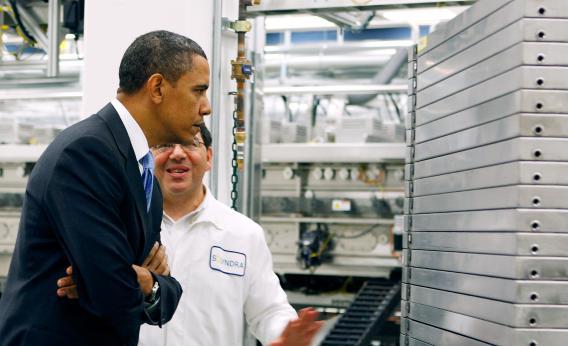To conservatives’ glee and liberals’ chagrin, another of President Obama’s pet solar-energy projects is going bust.
Abound Solar, a Colorado-based startup that was developing thin-film solar panels, will file for bankruptcy protection next week, taking with it 125 employees and $70 million in federal loans. Conservative blogger Matt Drudge immediately dubbed the company “Solyndra II,” and no doubt Mitt Romney will bludgeon Obama with its failure.
Abound isn’t quite Solyndra II, as I’ll explain. But the forces that felled it are exactly the same—which is why its failure proves nothing that Solyndra hadn’t already proved.
Three years ago, when Obama’s Department of Energy started approving some $16 billion in federal loan guarantees for solar energy companies, the price of conventional, crystalline silicon solar panels was high. So, along with much larger investments in solar power plants, the DoE agreed to back four startups that were working on ways to make solar panels cheaper. Two of these were Solyndra and Abound.
Not long afterward, solar-panel prices began to plummet, partly because China pumped massive subsidies into its own solar-manufacturing sector—and partly because Europe’s financial crisis spurred countries like Germany and Italy to cut back on their subsides for solar purchases. With a glut of supply and stagnant demand, prices were cut in half. And suddenly no one was clamoring for the technological advances that Solyndra and Abound had been working on.
That’s why, once Solyndra crashed, it was clear to anyone who was paying attention that the other three solar-panel companies could be in trouble too, says industry analyst Shayle Kann of GTM Research. And in fact, the DoE scrutinized Abound carefully and stopped loaning it money when it missed financial targets. So although it had a $400 million loan guarantee, it only actually borrowed $70 million.
The other two solar-manufacturing companies with loan guarantees, SoloPower and 1366 Technologies, have not actually borrowed money so far—which is surely a good thing for taxpayers, since the solar-panel market is unlikely to improve anytime soon.
For all the right’s fulminating about waste, fraud, and corruption, the story remains the same as it has since Solyndra: The Obama Administration invested in startups that were working on promising technologies, and some of those technologies haven’t panned out.
But others have. Of the DoE’s total loan portfolio, 35 percent went to solar power generation projects like the Ivanpah plant in California’s Mojave Desert, while just 4 percent went to risky solar-panel startups like Solyndra and Abound. The power generation projects appear in no such danger, though as I recently wrote, the company behind Ivanpah hasn’t taken off in quite the way it had hoped.
In a blog post responding to Abound’s bankruptcy, the DoE makes no apologies—and it shouldn’t. From the blog post:
While disappointing, this outcome reflects the basic fact that investing in innovative companies – as Congress intended the Department to do when it established the program – carries some risk.
In short, no one should be surprised by Abound’s failure, and no one should be outraged either. The real outrage would be if the United States allowed these setbacks to discourage it from investing in solar power altogether, ceding what remains one of the world’s most promising industries to China.
